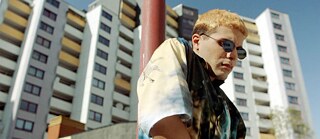Between racism and absurd expectations: Several films in the “Panorama” section explore post-migrant perspectives on Germany.
Germany is a country of immigration. The complicated-sounding term “post-migration”, which not only refers to people with a migration background but also presupposes immigration as a fact of society as a whole, implies nothing else. In film, theatre and literature this implicit presupposition is still reflected just as rarely as in politics. This is why in 2020 “post-migrant perspectives” will be a special focus of the entire Berlinale, but especially of the Panorama section. How does it feel to be born in Germany but still not really belong? Or to feel that way even though one has in fact long since moved on?
All just paranoia?
It is precisely this ambiguous feeling that Visa Moina enacts in
Exile. Like the director, Xhafer – personified by the well-known German actor Mišel Mišel – was born in Kosovo, but has long since made it: job, family, row house. But he still feels shunned by his colleagues. Everyone seems to stare at him and overlook him at the same time. He has evidently been removed from important e-mail distribution lists. Is it racism? His German wife Nora, played by Sanda Hüller, thinks he’s imagining things. Maybe he's just not all that likeable. The film’s brilliant take is that she could be right. Xhafer is no saint. But even in his paranoia one can see the deep core of a social problem. In its best moments, Moina's oppressively claustrophobic thriller looks like a German version of Michael Haneke's film
Hidden / Caché.
Young, gay and hedonistic
With
No Hard Feelings / Futur Drei, Faraz Shariat presents a decidedly more upbeat portrait of a new generation. His hero Parvis (Benjamin Radjaipour) is young, gay and refreshingly hedonistic. But everywhere, whether at parties or on Grindr dates, he is repeatedly confronted with his Iranian origins. Born in Hildesheim, but who cares! With his first love Amon and his sister Banafshe, he airs sometimes doubtfully, sometimes humorously questions of origin, language and identity, but also the absurd expectations of the locals. The briskly-montaged film incorporates old video footage of the director's parents, which in itself tells a story of Iranian immigration to Germany. They are played by none other than Shariat's own parents – a wonderful idea and the best possible statement on the subject of integration.
